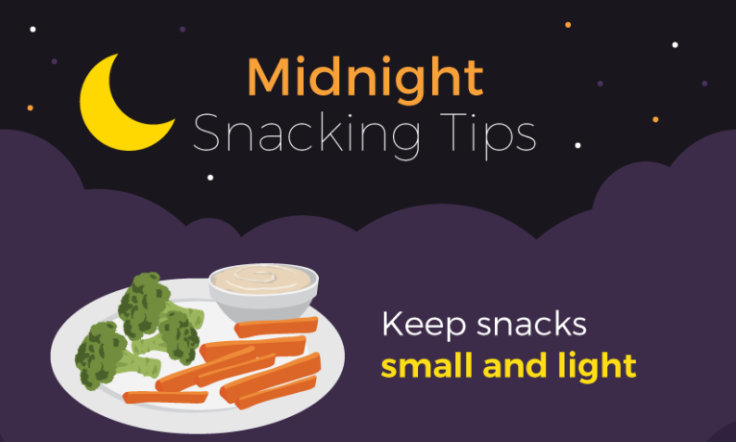Tips For Eating Midnight Snacks Before Bed: 2 Types Of Foods To Help You Sleep Late At Night

The rumbling sounds coming from our stomach start to echo throughout our room before bedtime. Late night hunger pangs go into overdrive as we raid our refrigerator like dumpster raccoons for fatty and sugar-laden foods to satisfy our taste buds. Yet, eating the wrong midnight snack before falling asleep can have negative health effects, from poor sleep to diabetes from excessive weight gain.
Luckily, there are a few tips that can help satiate our midnight cravings without jeopardizing our sleep or health.
In the infographic, "Midnight Snacks That Won’t Keep You Awake," Fix.com explains midnight snacking can be healthy by avoiding specific foods and drinks right before bed. Fatty, spicy, sugary, caffeinated, or alcoholic foods late at night are not digested properly, and interfere with our ability to sleep. For example, sugary foods can make our blood sugar spike and crash, which can lead us to waking up in the middle of the night.
Read More: Skipping Breakfast And Snacking Between Meals May Be Bad For Heart Health
Opting for foods that are rich in complex carbohydrates and some protein can make us feel fuller until the morning. When complex carbs are digested, they release serotonin, which helps calm us down before bed, while protein helps us feel and stay full. Foods and drinks including high-fiber cereal and milk, a piece of cheese and whole grain crackers, or a glass of water are healthy snacking options to keep us relaxed and feeling satisfied late at night.
But, why is late-night snacking so common?
A 2013 study published in the journal Obesity found the body's internal clock, the circadian system, increases hunger and cravings for sweet, starchy, and salty foods at night. This mechanism helped our ancestors preserve energy to survive during prolonged periods of food scarcity. But, in our current society, these high-calorie foods and beverages are detrimental to our health, leading to people being overweight or obese.
The key to indulging in midnight snacking is to keep it light and small and plan healthier food choices ahead of time. Although we may not feel immediately fuller after eating something, we should keep snacks small to get a good night's sleep. The body needs time to digest, which means there should be a gap between snacking and going to bed.
Midnight snacking is common, but it's best to avoid it altogether. Eating a varied diet, drinking plenty of water, and sticking to healthy portion sizes help curb this habit. But, if you're a night owl, be sure to keep your snacks small, space your time for digestion, and choose foods with complex carbs and some protein.
Remember, the midnight munchies doesn't always have to mean unhealthy snacking.

Source: Fix.com Blog
See Also:
Snacking Without An Appetite A 'Major Potential Cause Of Weight Gain'



























